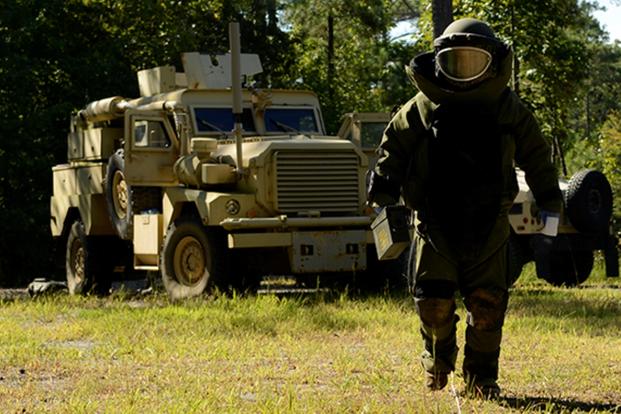The two U.S. bomb disposal experts recently killed in Syria and Iraq were probably more at risk in the demanding task of clearing enemy improvised explosive devices than other U.S. troops in the region, the top U.S. commander in Iraq and Syria said Monday.
All of the several thousand U.S. troops in Iraq and Syria are to some degree in harm's way but the Iraqi Security Forces and the local forces in Syria advised by the U.S. were especially reliant on the skills and bravery of the explosive ordnance disposal teams, said Army Lt. Gen Stephen Townsend, commander of Combined Joint Task Force-Operation Inherent Resolve.
The result was that the EOD specialists "will be at an increased risk, I think," Townsend said from Baghdad on C-SPAN's Washington Journal program, but it was "important for the U.S. and important for the entire world" to eliminate the threat from the Islamic State of Iraq and Syria, or ISIS.
On Thanksgiving Day last week, Navy Senior Chief Petty Officer Scott C. Dayton, 42, of Woodbridge, Va., was killed near Ain Issa, about 35 miles northwest of the Islamic State's self-proclaimed capital of Raqqa. It was the first time a U.S. service member had been killed in Syria since U.S. Special Forces deployed there in October 2015.
Dayton was assigned to Explosive Ordnance Disposal Mobile Unit 2 based in Virginia Beach, Virginia. On Oct. 20, Chief Petty Officer Jason Finan, 34, was killed outside Mosul in northern Iraq. Finan was also a bomb disposal technician and had been working with a team of Navy SEALs when he was killed.
Finan was the first U.S. service member killed in the offensive on Mosul, which began on Oct. 17. To date, a total of five U.S. service members have been killed in combat since U.S. troops began returning to Iraq in the summer of 2014.
Townsend described the Mosul offensive as "going pretty well" with Iraqi forces slowly expanding a foothold in the eastern sector of the city. The coordination of the Iraqi Security Forces with the Kurdish Peshmerga fighters and disparate local forces was further evidence of a "pretty remarkable turnaround" by the ISF, Townsend said.
"If you think about it, two years ago it was a defeated army, barricading the gates of Baghdad," Townsend said. However, the elite Counter Terrorism Service units, considered the best trained and equipped forces in the ISF, were now acting independently from the Iraq army under new authorization "just recently" approved by Iraqi Prime Minister Haider al-Abadi, Townsend said.
The CTS led the way into Mosul but progress was slow against ISIS car bombs, snipers and improvised explosive devices. "We must continue to advance because we suffer fewer casualties than if we hold still and wait for other units to advance in their sectors," said Brig. Gen. Haider Fadhil of the CTS said, the Associated Press reported.
"We are trying to advance cautiously to minimize casualties, and we are convinced that we will eventually be asked to liberate the western sector of the city when we are done here," Fadhil said.
In Washington, Defense Secretary Ashton Carter said he was "encouraged by Iraq's great determination in the face of the difficult fight" in Mosul. "I'm confident that ISIL's days in Mosul are numbered," Carter said, using another acronym for ISIS.
Carter spoke ahead of talks with French Defense Minister Jean-Yves Le Drian on the campaign against ISIS in Iraq and Syria.
-- Richard Sisk can be reached at Richard.Sisk@Military.com.






























